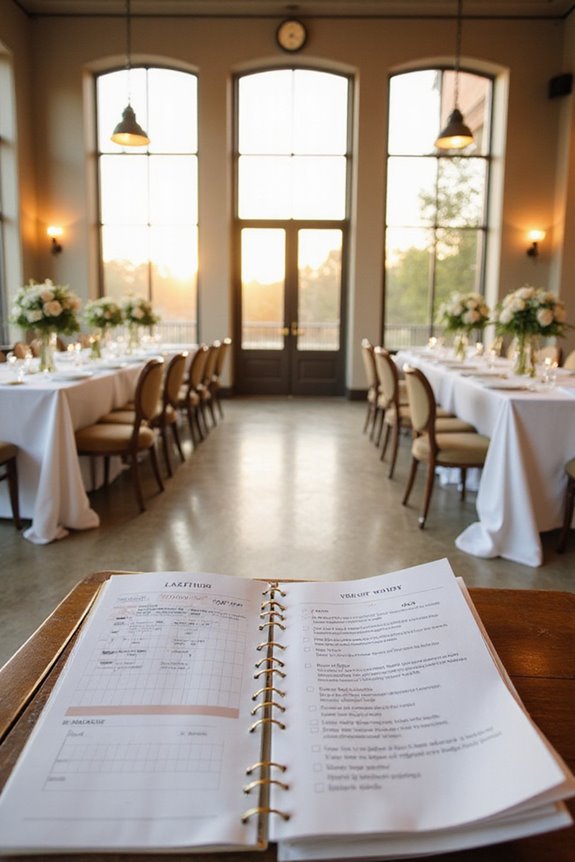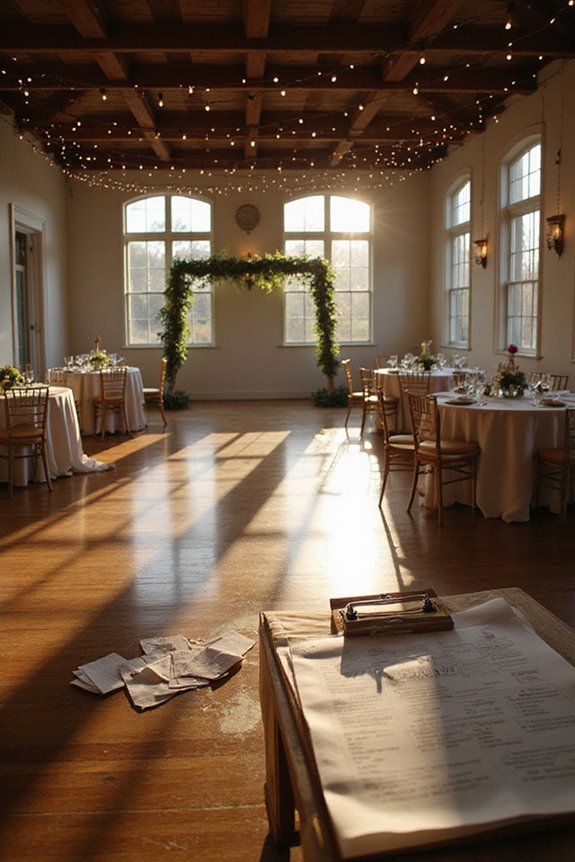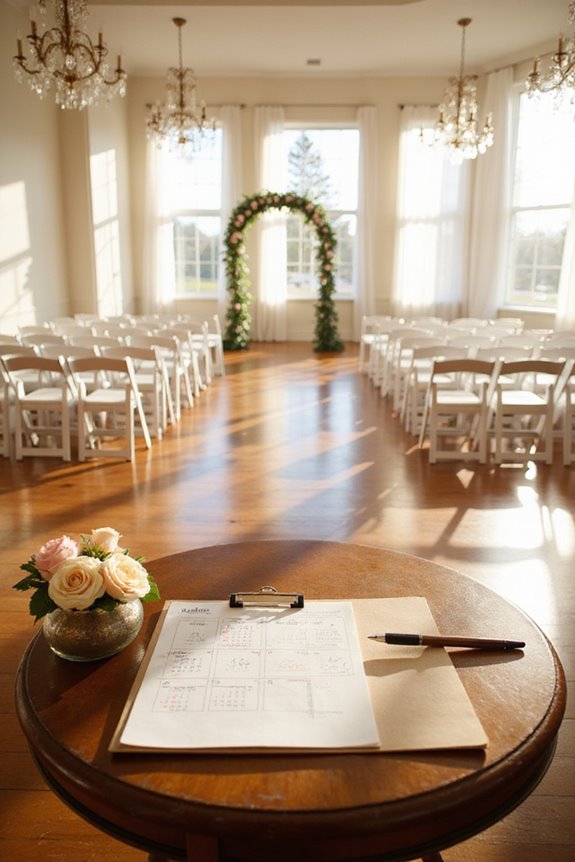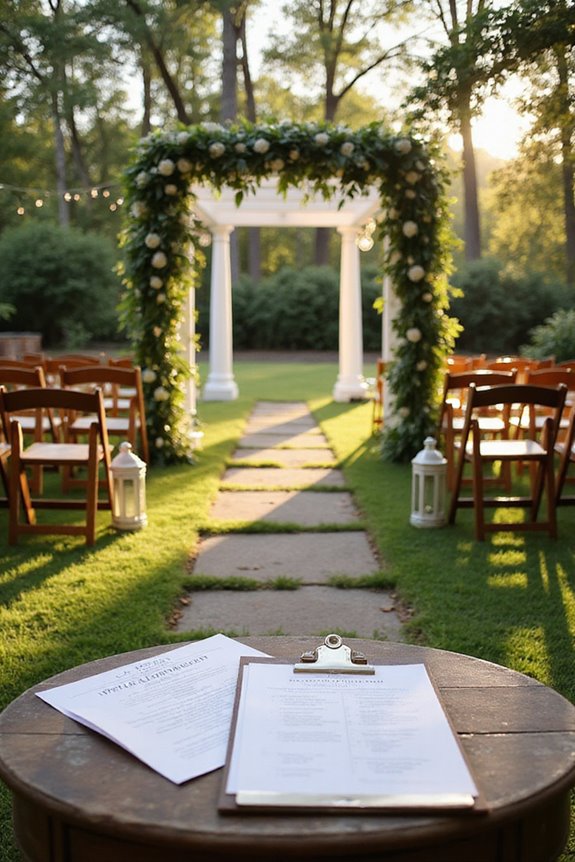Securing a venue is a vital step in event planning, and the timing can really make or break your experience. For weddings, we should book 12 to 18 months in advance, while corporate events need 6 to 12 months. If you’re planning a birthday bash, 3 to 6 months works! We can’t forget about early deposits and flexible contracts, too—they’re lifesavers. Stick around with us, and we’ll share more handy tips to make your planning smoother!
Key Takeaways
- Weddings should be secured 12 to 18 months in advance to ensure availability of desired venues.
- Corporate events typically require a lead time of 6 to 12 months for proper planning and logistics.
- Social events like parties generally need 3 to 6 months for venue reservations, depending on size and season.
- Larger galas may necessitate up to a year of planning to accommodate venue competition and demand.
- Early deposits and flexible contracts help secure preferred dates and allow for adjustments in case of cancellations.
Understanding Venue Booking Lead Times
When we’re planning an event, understanding venue booking lead times can make all the difference. Different venue types, like hotels and vacation rentals, have unique lead times. For instance, hotels usually require bookings 20 to 60 days in advance, while vacation rentals hover around 40 days.
Market variations also play a role; post-pandemic, many are booking events closer to the date. So, should we book early or wait? If we’re eyeing peak dates, locking in our venue sooner is wise. But for less popular times, we can play it cool. Just remember, quick follow-ups on inquiries can boost our chances of securing that dream space. Let’s navigate this together and make our event unforgettable!
Factors Influencing Booking Timing

Securing the perfect venue for our event can feel like a game of chess, where timing is everything. We must consider several key factors influencing our booking timing. Seasonal demand is huge; for instance, weddings often need 12-18 months of lead time. In contrast, smaller private events can sometimes make do with just 3-6 months.
Location matters, too. Venues in bustling cities experience fierce venue competition, calling for earlier reservations. And let’s not forget the size of our event! Larger gatherings require more planning and, often, more time.
Risks of Last-Minute Venue Reservations

The timing of our venue booking can really make or break our event. When we opt for last-minute reservations, we often face higher costs due to last minute pricing. Many venues charge premium rates, leaving us with fewer choices and potentially less desirable spaces. Imagine settling for a venue that’s not quite right for our needs!
To avoid this, it’s smart to book well in advance. This gives us better leverage for negotiations and guarantees we can secure a venue that fits our vision. Plus, early reservations help us avoid the stress of unexpected cancellations and logistical nightmares. Let’s commit to planning ahead, so our event shines without the last-minute chaos!
Recommendations for Different Event Types

Choosing the right venue for our event can feel overwhelming, especially with all the details to juggle. For weddings, it’s best to book 12 to 18 months in advance, especially if we’re eyeing those popular weekend dates. Wedding trends suggest early planning guarantees we snag that dreamy location. Additionally, considering guest comfort and experience can greatly enhance the overall atmosphere of the event.
When it comes to corporate events, we should aim for 6 to 12 months ahead. This gives us time to handle corporate logistics like tech needs and marketing materials.
For social events like parties, 3 to 6 months is usually enough, but larger galas may require up to a year.
Let’s not forget about concerts! Booking 6 to 12 months out helps us align with artist schedules. Happy planning!
The Importance of Early Deposits and Contract Flexibility

When planning an event, we can’t overlook the importance of early deposits and flexible contracts. By implementing smart deposit strategies, we secure our preferred venue dates, especially with the rising demand for special event spaces. Early deposits show commitment and help venues manage their calendars more efficiently.
On the flip side, we should also prioritize contract terms that allow for flexibility. Life happens, and our plans may change. Look for contracts that offer rescheduling options or tiered refund policies based on cancellation timing. This way, we can protect our investments while keeping our options open. So, let’s approach our venue bookings with a mix of early deposits and adaptable contracts. It’s a win-win for everyone involved!
Frequently Asked Questions
What Are the Best Months to Book for Seasonal Events?
When planning seasonal events, we should target January for spring weddings, September for holiday parties, and early summer for summer festivals. Autumn gatherings benefit from early fall bookings, ensuring we secure desired dates and venues.
How Do Venue Cancellation Policies Affect Booking Timelines?
In planning our events, we must navigate the treacherous waters of cancellation fees and refund policies. These factors often compel us to book earlier, ensuring we’re protected from unexpected financial repercussions while maintaining our event’s integrity.
Can I Negotiate Venue Pricing After Booking?
Yes, we can negotiate venue pricing after booking, especially if we strategically approach venue contracts with clear pricing strategies. Building relationships and timing our requests can enhance our chances of securing favorable adjustments.
What Should I Consider When Choosing a Backup Venue?
Choosing a backup venue’s like finding a safety net. We must prioritize venue accessibility and guarantee backup amenities mirror our primary choice, so attendees experience seamless comfort and support, regardless of where the event takes place.
How Does Event Size Impact Venue Selection Options?
When considering event size, we must prioritize venue capacity to enhance guest experience. Smaller gatherings allow flexibility, while larger events necessitate ample space and accessibility, ensuring everyone has a comfortable and engaging experience throughout.





